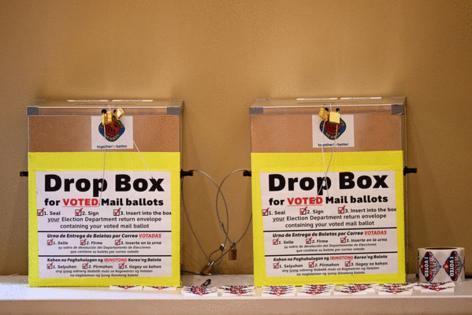Heidi Stevens: Trump's latest voting threat was inevitable next step in his long history of undermining electorate system
Published in Lifestyles
No one can say we didn’t see this coming.
Since the earliest days of the birther movement, Donald Trump has been diligently and incrementally chipping away at the American people’s constitutional right to free and fair elections.
He has repeatedly sowed baseless mistrust about the legitimacy of leading candidates. He has called numerous elections rigged. In a recorded call, he pressured Georgia’s Republican secretary of state to “find” enough votes to overturn 2020’s presidential election results. When that didn’t work, he claimed, over and over, that the 2020 election was stolen from him.
In the lead-up to the most recent presidential election, he refused to say he would accept the results unconditionally. “If everything’s honest, I’ll gladly accept the results,” he said in May 2024. “If it’s not, you have to fight for the right of the country.”
He was sworn in eight months later.
On his first day back in office, Trump pardoned every person charged or convicted for their role in the Jan. 6, 2021, insurrection — the last time his supporters decided to fight for the right of the country.
So by the time Trump announced on his social media site Monday that he plans to get rid of mail-in ballots and voting machines before the midterm elections next year, it felt inevitable. A logical escalation of the cynical disenfranchisement that has long been his calling card.
Calling voting machines “highly inaccurate” (a claim that has been repeatedly debunked by research), Trump wrote that he plans to sign an executive order barring states from using them. He also went after mail-in ballots, inaccurately stating that the United States is the “only country in the world” that uses them. (Dozens of countries allow mail-in voting.)
But when you can’t lead with moral authority, when you keep alienating your allies, when inflation is up and your approval ratings are down, what options do you have to hold onto this seat you so deeply coveted?
You can hope enough voters are happy enough with their 401(k) statements.
Or you can double down on undermining confidence in the American electoral system — a system more fundamental and foundational to our democracy than any other. After all, If we don’t have the right to elect our own leaders, to freely decide who represents us, to judiciously choose which policies and programs and pursuits we want to elevate and which we want to reject, what rights do we really have?
Here’s the thing about our rights under President Trump: He’s not a fan. He doesn’t pretend to be. He has shown a willingness — an eagerness, even — to blur, curtail or remove Americans’ rights to free speech, free assembly, a free press, due process, reproductive health, marriage equality and birthright citizenship, among others.
He primed the pump by attacking the rights, at first, of mostly vulnerable groups. Groups who are marginalized. Groups who don’t have clout. Groups who are easily and historically villainized and scapegoated and turned into cultural boogeymen. So taking their rights away can be spun as a victory for morality or safety or order, when in fact it is nothing more than a test balloon.
Absolute power corrupts absolutely. But if George Orwell’s “1984” taught us anything, it’s that it also corrupts strategically. Methodically. Deliberately.
And it’s helped along by folks who watch the rights disappear from people who don’t look like them, who don’t vote like them, who don’t love like them, and think, “Eh, they had it coming.”
You’re no doubt familiar with Martin Niemöller’s poem, “First They Came.”
First they came for the Communists
And I did not speak out
Because I was not a Communist
Then they came for the Socialists
And I did not speak out
Because I was not a Socialist
Then they came for the trade unionists
And I did not speak out
Because I was not a trade unionist
Then they came for the Jews
And I did not speak out
Because I was not a Jew
Then they came for me
And there was no one left
To speak out for me
It was written in 1946, but it sounds a timely alarm. Nothing good has ever come from citizens having fewer rights to protect them or less say in who leads them.
©2025 Tribune News Service. Distributed by Tribune Content Agency, LLC.
























Comments